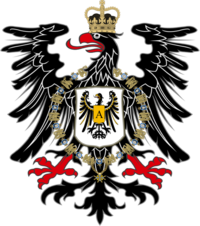Imperial Council (Eniarku)
Imperial Council Імператорський рада | |
|---|---|
 | |
| Type | |
| Type | Upper House |
| Leadership | |
Chairman of the Imperial Council | Mason Horn since appointed May 18, 2011 |
| Seats | 4 |
| Elections | |
Last election | N/A (by monarchial appointment only) |
| Meeting place | |
| Various locations within the capitol | |
| Website | |
| none | |
The Imperial Council of the Imperial Assembly of Eniarku, commonly referred to simply as the Imperial Council, is the upper house of the Eniarkian Imperial Assembly, the legislative branch of the nation. While the Council has no practical legislative powers, it is able to influence the decisions of the Imperial Duma by granting—or in some cases, not granting—consent for the bill to pass to the monarch, who then gives or does not give Imperial Consent to the bill, after which it does (or does not) become law in the empire. Members of the Imperial Council are appointed by the Emperor rather than directly elected like members of the Imperial Duma.
Powers
As the upper house of the Imperial Assembly, it is typically viewed as the more formal of the two chambers. The Imperial Council is charged with cooperating with the Imperial Duma to draft bills and laws on all matters. Specific matters, however, such as foreign affairs, customs policies, military policies, and budgets, are also subject to scrutiny from numerous committees both within and outside of the Assembly.
Powers that are delegated only to the Imperial Council are as follows:
- the power to ratify treaties and other diplomatic documents that originated (and passed) in the Imperial Duma;
- the power to approve a decree of the Emperor that introduces martial law;
- the power to (in a time of war) deploy the Armed Forces to attack an enemy;
- the power to approve nominations made by the Emperor for judges of the Supreme Court;
- the power to maintain the nobility system and awards; and
- the power to approve amendments to laws, or the passage of bills that would override existent laws
For the Council to vote on a bill, there must be at least one more than half of its current members present. The Council may veto a bill passed by the Imperial Duma, at which point a Coalition Committee is formed and drafts a compromise bill, which is again voted on between the two chambers. However, a two-thirds majority vote can override a Council veto.
This article has not been added to any content categories. Please help out by adding categories to it so that it can be listed with similar articles. (July 2023) |